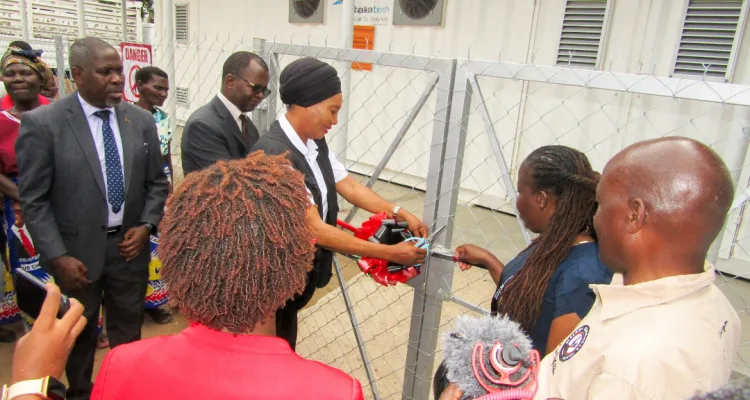
Partners In Health/Abwenzi pa Zaumoyo has handed over an oxygen plant worthy 3.2 Billion Kwacha installed at Chikwawa district hospital to serve the two districts of Nsanje and Chikwawa which were all accessing oxygen from Queen Elizabeth Central Hospital in Blantyre.
Speaking at a handover ceremony on Thursday at Chikwawa district hospital, PIH Executive Director, Basimenye Nhlema, said the Pressure- Swing Adsorption (PSA) plant, has been installed under the “Building Reliable Integrated & Next Generation O2 Services (BRING O2)” Grant which her organization implemented, funded by UNITAID.
Nhlema said PIH, in collaboration with the Ministry of Health, started this project following the observed gap in access to medical oxygen supplies in health facilities across the country.
“As indicated in the Malawi National Medical Oxygen Ecosystem Roadmap 2021–2026, the country needs an estimated supply of oxygen amounting to 115,156,050 litres (equivalent to 16,935 “J” cylinders) per month.
“However, this demand has been unable to be met due to inadequate PSA plants, inability to maintain existing PSA plants and insufficient oxygen cylinders to capture and store oxygen, as well as a lack of distribution systems to reallocate supply.
“It is for this reason that PIH embarked on a journey to increase the oxygen delivery capacity and access across the country in 2021. This project mainly focused on 6 districts of Neno, Mwanza, Balaka, Chikwawa, Nsanje and Nkhata-Bay to alleviate PSA plant supply and demand pressures but also strengthen oxygen equipment, delivery, and logistics,” said Nhlema.
It is further reported that through the BRING O2 grant, PIH has also handed over a vehicle to Chikwawa DHO to ensure a smooth flow of oxygen between the two districts and it has also completed maintenance of the PSA Plant at Nkhata-Bay District Hospital and Oxygen Cylinder Cages have been constructed in the three districts of Chikwawa, Neno and Nkhata-Bay.
She said currently, PIH is installing piped oxygen systems in 5 district hospitals of Neno, Balaka, Mwanza, Nsanje and Chikwawa, but also at Lisungwi Community Hospitals to ensure efficient, reliable and cost-effective supply of oxygen to patients in need of respiratory support.
Nhlema has then reaffirmed PIH Malawi’s unwavering commitment to supporting the Government in the provision of quality medical oxygen to patients in the Lower Shire Region and added that it will help health institutions in the region to cut expenditures.
Presiding over the hand over ceremony was Deputy Minister of Health, Halima Daudi who hailed PIH for the plant saying in the delivery of health care, blood and oxygen are two things that are medicines in their own right and have no alternatives.
Daudi added that this donation will go a long way to help the Government in the provision of quality medical oxygen to patients in the Lower Shire Region, and added that it will help health institutions in the region to cut expenditures.
“Records show that currently, Chikwawa District Hospital spends a lot of money to procure medical oxygen. With the launch of this oxygen plant, this will be a thing of the past. The hospital will save some money that will be used for other important causes in health service delivery.
“This oxygen plant has the capability of filling twenty (20), 50-litre capacity oxygen gas cylinders per day. This implies the plant will not be a source of medical oxygen only for the district hospital at Chikwawa but also for all health centres in the district. Again, because of the same capability, the plant is expected to supply oxygen to Nsanje District Hospital and the health centres in Nsanje District,” said Daudi.
The Deputy Minister has then pleaded with Chikwawa and Nsanje councils to jointly ensure that the Oxygen Gas Plant at Chikwawa District Hospital is used as a shared resource for the entire region and maintained through cooperation and responsibility.
While commending Partners In Health for being exemplary, Daudi asked other well-wishers to supplement the efforts to provide service contract cover for the plant and also help the Government to secure additional gas plants and other oxygen therapy technologies for hospitals not yet covered.














